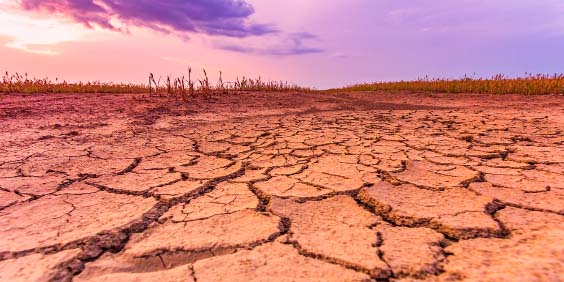How Are Natural Catastrophes Influencing African Insurance Markets?

By Liz Booth of Africa Ahead
With natural catastrophes seemingly on the rise, the risk of growing uninsured and under-insurance across the continent is growing, according to a group of insurance experts.
Meeting as part of a round table, organised by Africa Ahead and Mukfin, the group agreed that the impact on the uninsured is growing but also questioned whether over-development is playing its part in causing problems.
The group also agreed that the growing number of climate-related claims is likely to impact on the African insurance market, resulting in higher premiums alongside tougher terms and conditions and even running the risk of certain properties becoming uninsurable.
Lesley Ndlovu, CEO at Africa Risk Capacity (ARC) Ltd, said “On the one hand from a statistical point of view we don’t have enough data to definitely pronounce whether the loss trend is worsening or not because climate is something that manifests itself over a very long period of time.
“However, anecdotally when you look at the last five years there has been considerably more loss activity than we had in the previous five years. By example, last year we had droughts in the Sahel, west and central Africa, eastern Africa as well as in southern Africa. Generally speaking, you would expect those events to be diversifying and based on our model it was a one-in-200-year type loss.”
He added: “Then on the tropical cyclone side, if you look at what is happening in the Mozambique channel with events like Cyclone Freddy, when you model it out it was a one-in-1000-year loss.
“If you look at all of this you would be hard-pressed to say that the loss picture is not worsening.”
As an insurer, he said: “The way we are approaching our pricing, at ARC we have started to use simulated data. So, we don’t only use historical loss data but use predictive loss data, so we are not giving undue weight to the historical loss trends.
“The second approach that we have taken is that instead of relying on 40 years of historical data, we did some analysis and realised that only the data from the last 20 years is actually relevant for the paradigm that we are in. So, we have shortened the data that we use from 40 years to 20 years. We are adding each new year and dropping off the 20th year and add to this the simulated data so we are giving a better picture than simply relying on historical data.”
Chalo Ng’ambi, general manager at Emeritus Re, joined the conversation to talk about his experience in Mozambique. “We have had a series of cyclones from 2019,” he said “and most recently Cyclone Freddy. The frequency of the cyclones is becoming quite heavy and Cyclone Freddy was one of the longest on record, at more than 30 days. It hit Malawi and Zimbabwe quite heavily.
“The way that cyclones are coming through is not the same as in the past and it is important to raise awareness. Sugar crops, for example, were under water for more than a month, leaving farmers waiting, buyers waiting and the impact was bad.”
“Botswana is better known for drought than for rain,” said Nokuthaba Mthunzie, chief products and innovation officer at Botswana Insurance Company. As insurers, there is little data, but the farmers have huge volumes of historical data stored in their family histories.
“The farmers have 100 years of data because their family has been farming the same land for several generations,” she explained. “However, now they get affected because they have the tradition of planting at a certain time; but that no longer correlates with what is happening on the ground. We have flooding in the wrong season and continuous rain for seven days, which has never happened before. So, it means there is a new set of data emerging and that is challenging the farmers’ generational data.
“We also have a problem because one farmer might get hit badly but not his neighbour, and some of the insurance requires a trigger such as the government announcing a catastrophe, but that won’t happen because not all farms are affected. They might have insurance, but it won’t pay out, which is a challenge.”
Junior Ngulube, former CEO at Munich Re of Africa and former director at Sanlam, believes the main threat of climate change in Africa is to crops, mainly from hail or frost or drought.
He said, for insurers, the main challenge is understanding the crops and the impact of an extreme weather event. Crop insurance offers two types of cover, he explained.
“The first cover means you are actually insuring and measuring what has been damaged by the peril. So, for example, if it is a wheat crop you need to be able to quantify what the yield should have been and what has been lost.
“Each crop behaves differently. So, the big thing about this type of insurance is that you need a loss adjuster who should know more about the crop than the farmer himself and be able to tell the farmer it is, say, a 20% loss and convince him of the technical reasons behind that decision. You cannot send a motor adjuster; you need the right expert.”
By contrast, for multi-peril cover and events such as drought, insurers are actually measuring what is left, he explained. “If you are expecting 10 tons of yield but see that there will be six tons harvested, the difference is what the insurers will pay out.”
He was extremely worried that the experts are not being recruited and trained and few insurers have truly knowledgeable loss adjusters. This was echoed by Sipho Mthabala, Munich Re, who fears the problem is much wider than simply loss adjusters. “It is a much wider problem we are having. In the insurance space we have a lot of people leaving the market, but not enough young people coming in. That is feeding into products and also in terms of risk management. It is manifesting itself in a much wider way,” he warned.
Back to the threat from natural catastrophes, where Ngulube pointed to the way “rich people retire to Florida. Houses there are made of wood and more and more properties are built in the path of hurricanes; can we really blame nature when we build in these areas?
“Bring that back to Africa, and the sugar fields of Umhlanga are now built over. It is about the concentration of values in the wrong place. Look to Zimbabwe and particularly Johannesburg, we tend to rezone what was previously waterways for housing.”
He said that “between 1900 and 2019 there were 344 severe flooding events – an average of three a year – so it is not a new problem. What has changed is that high value properties are sitting where they shouldn’t.”
Ngulube then pointed to Mauritius, which has an average of 11 cyclones a year. “In Mauritius, in terms of building standards, your roof has to be made of concrete and you are only allowed so much window,” he said. “The population also has strict rules about what to do in a hurricane. We have to be careful in isolating what is climate and what is human behaviour.”
Simba Mukonzo, CEO of Mukfin, pointed out: “There is one statistic which says low-income countries account for only 9% of global disasters but 47% of fatalities. If climate risks are increasing the rate of natural disasters in Africa, there needs to be a new approach. The consequence for insurance is that premiums will go up, so we need to focus on what we can control, on risk mitigation.
Mthabala added: “Linked to that is the issue of underinsurance. Penetration is quite low across Africa outside of South Africa – Kenya leads the way with one point something per cent. Nigeria is actually 0.3%, so a lot of our people are not insured. When these events take place, there is no cover. They rely on the government. It is hard for the insurance industry to take a lead on this, but perhaps we could be collaborating with those governments more.”
However, they all agreed, whether or not natural disasters are increasing, the reality on the ground is that more people are being affected, and often high-value properties along with everything else.
The upshot is that the insurance industry will be impacted one way or another. If it is to remain sustainable, it needs to collaborate with government and even local authorities to manage future developments to reduce the risk.
Risk management, they all agreed will be essential in reducing exposure and protecting not just consumers but insurance companies themselves.
Source: afahpublishing.com





